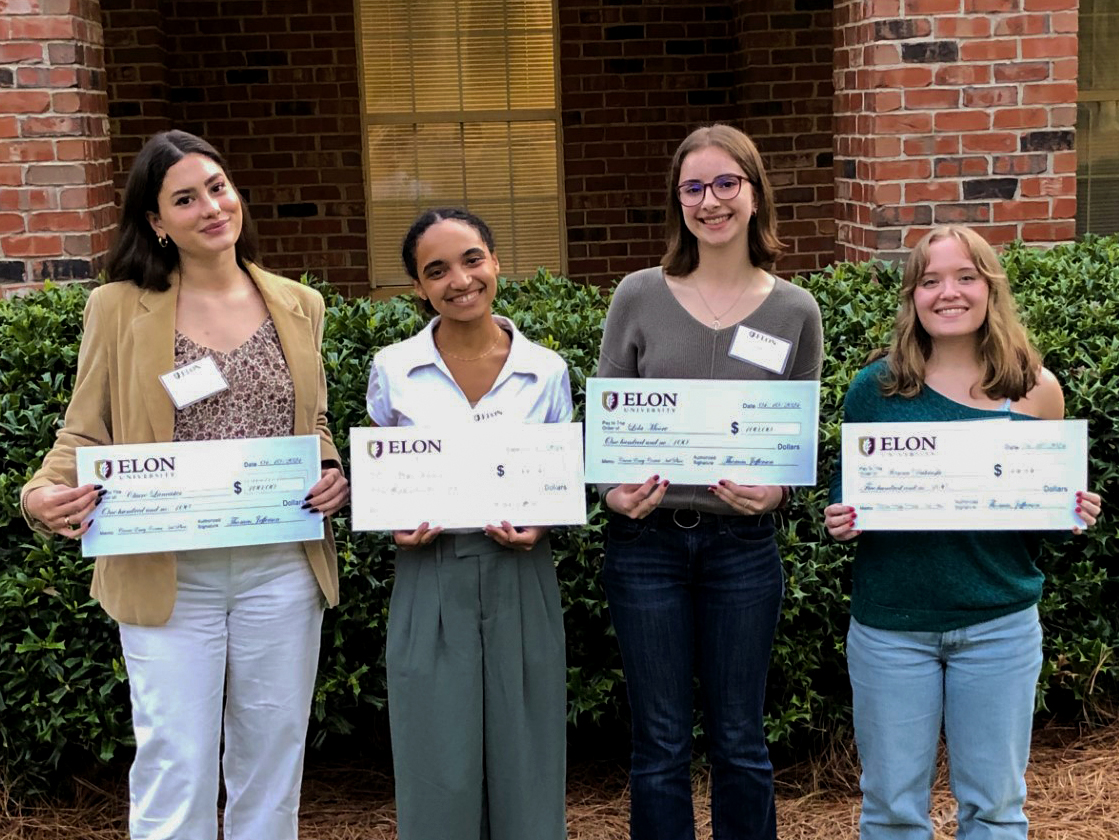Maya Simmons ’24 won first place in the 2024 Phillip L. Carret Thomas Jefferson Essay Contest. Kenna Dubraski ’24 won second place, and Lola Moore ’26 and Claire Lancaster ’24 tied for third.
Winners of Elon’s annual essay competition around the life and ideals of founding father Thomas Jefferson were announced at an event earlier this month.
Maya Simmons ’24 won first place in the Phillip L. Carret Thomas Jefferson Essay Competition for her poem, “The Sound of Sally: A Sestina,” and was awarded $1,000 and a trip to Monticello, Jefferson’s estate in Charlottesville, Virginia. Simmons was inspired to write the poem after her Winter Term global study experience in Ghana and visiting sites where the slave trade flourished during Jefferson’s time.
Kenna Dubraski won second place, and Lola Moore ’26 and Claire Lancaster ’24 tied for third. All four winners have strong ties to the Department of English and the Professional Writing and Rhetoric Program. They will present their work from 10 to 11:30 a.m. on Tuesday, April 30, in the Koenigsberger Learning Center, Tuesday, April 30, during Spring Undergraduate Research Forum (SURF) Day.
The Phillip L. Carret Thomas Jefferson Essay Competition is an endowed contest created in 1997. Carret, a longtime New York investor, became enamored with Elon after visiting the campus in 1996. The contest was created to encourage students to reflect on the ideals and principles embodied in President Thomas Jefferson’s life and career. Elon’s American Studies Program administers the annual competition.
This year’s entrants were asked students to respond to the following prompt:
In this year’s common reading, “I Never Thought of It That Way,” author Monica Guzmán describes American national politics as “dangerously divided”: “If there’s one thing that most people on the left and right can agree on, it’s that the way we treat and talk to the other side is broken. We can’t stomach the ideas across the political divide, let alone the people who hold them.”
In what ways did Jefferson and his contemporaries contribute to their own dangerously divided times and/or help Americans to negotiate these divides? Choose at least one divisive issue and analyze how Jefferson attempted to resolve it.
About Simmons’ poem, judges remarked:
“Maya’s poem emphasizes the many contradictions of Jefferson’s ideas and actions, including colonization and his long-term relationship with Sally Hemmings, a woman who he enslaved. The poem explores Sally’s erasure from history, reflecting how slavery divided Jefferson’s intellectual commitments to equality from his lived experiences as an enslaver and how it divided African Americans from Africa. The poem reminds us how the history and memory of slavery continues to divide Americans today.”
This year’s judges were Associate Professor of Sociology Raj Ghoshal, Lecturer in Political Science and Policy Studies Thomas Kerr and Assistant Professor of History Amanda Kleintop.



